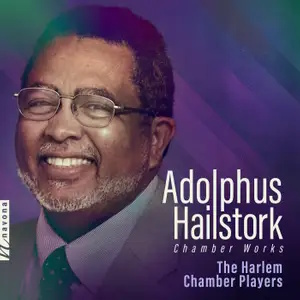
Adolphus Hailstork (b. 1941)
Piano Quintet “Detroit” (2018)
Nobody Know (2018)
David Berry (piano)
Kenneth Overton (baritone)
The Harlem Chamber Players
rec. 2023, New York
Navona NV6667 [44]
Adolphus Hailstork’s music is barely known in the UK, although he was featured on the long running BBC Radio 3 series Composer of the Week in 2022 – a singular honour and long overdue. Over the course of his long career he has written in most genres, including works for chorus, solo voice, piano, organ, various chamber ensembles, band, orchestra, and opera. For many years Dr. Hailstork has lived in Virginia Beach, Virginia, only a thirty-minute drive to Old Dominion University in Norfolk, where he is Professor of Music and Eminent Scholar.
His music blends African, American, and European traditions with the impeccable technique one would expect as a student of Vittorio Giannini, David Diamond and Nadia Boulanger. The latter two are noted for their highly demanding approach to teaching composition. Not nearly enough of his craftsmanlike communicative music has been recorded, so this disc of some recent chamber music is very welcome, even if at only 44 minutes it is rather short. Also short are the liner notes which on a double-sided single sheet give only the barest details about the two works, and nothing about the performers.
The composer tells us that the city of Detroit has been important in his musical development as he received a variety of commissions from a range of high-profile performers based there. Unlike Michael Daugherty’s violin concerto Fire and Blood, which was inspired by Diego Rivera’s Detroit Industry murals,there is no explicit programme to follow in the quintet, although the movements are headed, Detroit Grit, Detroit Nocturne, Detroit Rise and Prayer.
The opening of the work Detroit Grit is a dark and dramatic movement full of resilience and determination. There are emphatic flourishes from the quartet and pounding chords on the piano. Gritty and powerful it certainly is. Solos rise out of the textures emphasising the individuals who made the city. The dejected sounding second movement, Detroit Nocturne, seems to be a portrait of the city at its lowest. Part blues, part night music, the syncopated pulsing that appears part way through indicates that there is still hope.
Detroit Rise alludes to the city’s recovery from the tragic economic collapse and social decline that brought the city to its knees early this century. It takes a good two minutes for the rise to occur, and the opening continues the brooding mood of the preceding movement, then the music leaps off with triumphant flourishes and double stops on the strings and an assured walking bass in the piano. The finale, Prayer,functions both as a coda and as a memorial to Brazeal Dennard, who was a mentor to Hailstork and directed the Brazeal Dennard Chorale based in the city. It is full of the warmth and compassion of good gospel harmonies and draws some heartfelt playing from Berry and the Harlem Chamber Players. The quintet is undoubtedly a work with crowd appeal that would provide welcome relief from the many standards of the German tradition which dominate concert programmes.
The disc ends with a scena for baritone and quartet entitled Nobody Know, a setting of a text by American poet Herbert Martin. It depicts, as the liner notes make clear, “a ‘song from the other cross,’ a viewpoint of one of the thieves crucified with Christ on Good Friday [and] who spoke to Christ.” The writer further contrasts the attitude of the first thief, who says, “If you are the Savior, why don’t you save yourself and us as well?,” with that of the second thief, a Black man, who, accepts he is guilty, “seeks redemption and salvation because he is in the presence of the Divine.” The vocal setting is very straightforward. Kenneth Overton has a silky tone, and he and the quintet bring the man and his plight vividly to life.
Hailstork cleverly paces the work with the two slow outer sections set off by the lively middle part setting the words “I was a-rollin’ through an unfriendly world … I have been robbed of everything, even liberty”. Surprisingly there is no reference to the gospel tune “Nobody Know the trouble I seen” and the title comes from the final section of the work “Nobody know the trouble he see; see dem nails in his hands.” The soloist’s final words asking Christ to “Remember me” which repeats to silence is very affecting. Overall it is an effective work, but I do feel the quartet to be somewhat limiting and that the works emotional impact would be greater if an orchestral version was made.
The disc comes in simple cardboard slip case which is strong enough. As I mentioned earlier I found the liner notes to be somewhat wanting; perhaps a link to a web address with fuller information could have been provided. The sound quality is excellent throughout and the composer could not want for better performers.
Paul RW Jackson
Buying this recording via a link below generates revenue for MWI, which helps the site remain free

















